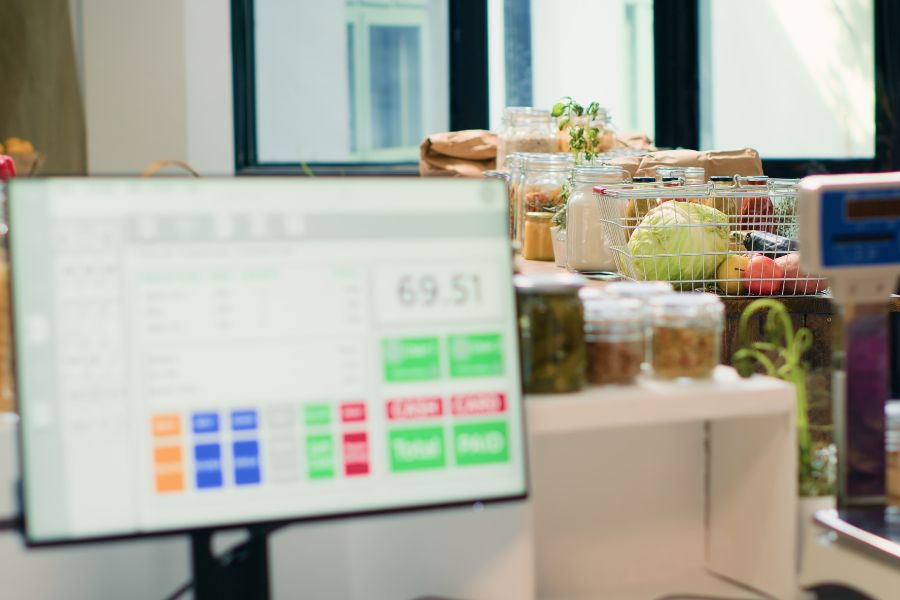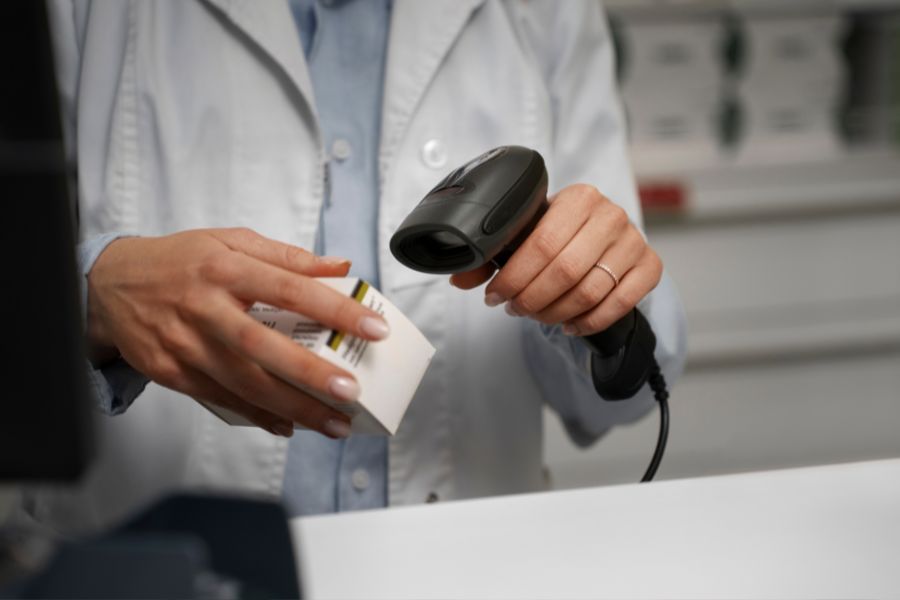The Malaysian retail sector is projected to reach USD 89.66 billion in 2024, growing at a CAGR of 5.94% to USD 119.64 billion by 2029. This growth reflects changing consumer behavior, with shoppers seeking seamless, personalized experiences across various platforms. To adapt, businesses in Malaysia are adopting POS software to elevate their omnichannel strategies. Integrating physical stores, online platforms, and mobile apps can provide a unified customer experience, improve efficiency, and boost sales. This article explores omnichannel retailing and the key features of POS software for Malaysian businesses to succeed in a competitive market.
Highlights:
- With the country’s retail sector projected to reach USD 119.64 billion by 2029, the demand for integrated shopping experiences across physical and digital channels is driving businesses to embrace omnichannel strategies to meet evolving customer expectations.
- Advanced POS systems equip businesses with tools to unify sales, inventory, and customer data, enabling seamless operations and personalized shopping experiences that resonate across every sales channel.
Unlock the Power of Omnichannel Retailing for Malaysian Businesses
As the retail environment in Malaysia becomes more interconnected, consumers are looking for flexibility and convenience. Omnichannel retailing is creating a smooth, consistent experience across different shopping platforms – in-store, online, or through mobile devices. This approach empowers businesses to engage customers wherever they are, providing a more convenient and personalized shopping experience.
With the growing reliance on e-commerce, Malaysian businesses are increasingly focusing on integrating online and offline channels. This shift is driven by the rise of mobile and digital shopping habits, where customers expect to browse, order, and pay for products seamlessly across different platforms. A study by the Malaysian Digital Economy Corporation (MDEC) indicates that the country’s e-commerce market is poised to surpass RM 28 billion by 2025, underlining the importance of adopting omnichannel strategies.
By leveraging POS software designed for omnichannel integration, businesses can synchronize inventory, manage customer data, and streamline sales processes in real time. This helps retailers meet customer demands and improves operational efficiency, ultimately enhancing the bottom line.
Through an omnichannel approach, Malaysian businesses can better position themselves to capitalize on the retail sector’s growth and meet their customers’ evolving expectations.
Requirements for an Impactful Omnichannel Strategy
For a successful omnichannel strategy, Malaysian businesses must integrate their customer touchpoints, both online and offline, into a cohesive system that delivers a seamless experience. Several key factors contribute to making this strategy effective:
Unified Customer Data
Businesses need to have a single view of their customers. When businesses integrate customer data from all touchpoints – online, mobile, or in-store – they can personalize experiences and offer relevant recommendations. For example, Zalora Malaysia uses customer data to personalize shopping experiences on both its website and mobile app, which helps build a more direct connection with shoppers.
Consistent Messaging Across Channels
Whether a customer interacts with a store through its website, a mobile app, or on-site, the brand’s messaging should feel familiar. Brands like Uniqlo Malaysia, which provide consistent product details, promotions, and overall branding both online and in-store, are able to create a smooth customer journey that encourages repeat visits.
Real-Time Inventory Management
A real-time inventory system keeps track of stock across various channels. This guarantees that customers don’t experience issues like stockouts when shopping across platforms. For instance, retailers such as Lazada Malaysia leverage real-time inventory systems, supporting customers to buy products online and pick them up in-store or have them shipped.
Multiple Payment Options
Customers expect flexibility when paying, whether they’re shopping online or in-store. Offering various payment methods like credit cards, debit cards, and e-wallets across all channels makes the transaction smoother and more customer-friendly. Retailers like H&M in Malaysia provide easy payment options both online and in-store to meet this demand.
Efficient Customer Support
An omnichannel strategy also means providing support that spans across platforms. Effective customer service, whether it’s through live chat on the website or on-the-ground support in stores, is crucial. For example, Sephora Malaysia’s live chat feature is an excellent way to assist customers whether they’re shopping online or in person.
Features that Make Omnichannel POS Software Essential for Success
Retailers who want to stay competitive with an omnichannel approach need POS systems that integrate all customer touchpoints.
- Real-Time Inventory Synchronization
Omnichannel POS systems allow businesses to manage inventory from both physical stores and e-commerce platforms in real-time. This reduces stock discrepancies, preventing issues where a customer purchases an item that is out of stock. Retailers like Nike, with their integrated POS systems, have reduced over-selling while offering customers flexible shipping or pick-up options.
- Integrated CRM
A good POS system integrates customer relationship management (CRM) capabilities, making it easy to track customer preferences and purchase history. This integration allows businesses to send personalized promotions, enhancing customer loyalty. Sephora Malaysia’s CRM system tracks purchase data, which it uses to send tailored product recommendations and promotions to customers across different platforms.
- Mobile POS Support
With more customers shopping on the go, POS systems with mobile capabilities allow sales associates to process transactions from anywhere in-store. This flexibility lets staff check inventory, complete sales, and engage customers seamlessly. Retailers like FashionValet in Malaysia use mobile POS to provide a more personalized experience while customers browse in-store.
- Seamless Omnichannel Payments
Whether customers are shopping online or in-store, they should be able to choose from a range of payment methods, including credit cards, e-wallets, and debit cards. An omnichannel POS system ensures that customers can make purchases in a way that’s convenient for them. Brands like Mr. DIY have integrated various payment options, allowing for a more seamless transition between online and in-store purchases.
- Advanced Analytics and Reporting
A sophisticated POS system collects data from all sales channels, providing businesses with insights into customer behavior, product performance, and sales trends. This information helps businesses make informed decisions about inventory and marketing. Retailers like Shopee Malaysia use the analytics from their POS systems to adjust inventory and marketing strategies in real-time.
- Customer Loyalty Programs
Omnichannel POS systems allow businesses to manage loyalty programs across online and in-store transactions. For instance, Cold Storage Malaysia enables customers to earn and redeem loyalty points regardless of how they shop. This consistency builds stronger relationships with customers, encouraging repeat purchases and brand loyalty.
Top 5 POS Systems Elevating Malaysian Businesses to Omnichannel Success
In this section, we explore five POS software for Malaysian businesses, each with standout features tailored to different business needs, from seamless inventory tracking to advanced data analytics.
Refined Intro and In-Depth Features for POS Systems
Modern businesses in Malaysia face unique challenges as they adapt to the evolving retail landscape. A solid POS system is a key asset for managing multi-channel operations, engaging customers, and optimizing business performance. Below, we explore five POS systems, each with standout features tailored to different business needs, from seamless inventory tracking to advanced data analytics.
ConnectPOS
ConnectPOS takes the lead with its robust features tailored for omnichannel strategies. This system bridges the gap between physical and online stores, enabling Malaysian retailers to provide a unified shopping experience.
Highlight Features:
- Real-Time Data Synchronization: Transactions and stock levels are updated instantly, minimizing manual adjustments and errors.
- Customer Insights Hub: Aggregates customer purchase histories to support targeted campaigns and loyalty programs.
- Customizable Workflows: Adaptable for businesses of all sizes, with scalable options for growing operations.
- Multi-Payment Flexibility: Accepts diverse payment types, including digital wallets and installment options.
- Cross-Channel Reporting: Provides a consolidated view of sales, inventory, and customer data, making strategic planning more effective.
- Seamless Marketplace Integration: Works effortlessly with platforms like Magento, Shopify, and WooCommerce.
With a focus on omnichannel efficiency and scalability, ConnectPOS empowers businesses to meet the expectations of modern Malaysian consumers.
StoreHub
StoreHub is a straightforward yet powerful POS system that helps small to medium businesses unify operations across channels. While its feature set is more basic than some competitors, it still enables businesses to manage omnichannel operations effectively.
Highlight Features:
- Order and Inventory Tracking: Centralizes operations with synchronized updates across physical and online channels.
- Customer Loyalty Integration: Simplifies the management of reward programs, though it may be limited in advanced personalization.
- Expense Management Tools: Tracks operational costs alongside sales, offering basic financial insights.
Best suited for smaller retailers, StoreHub supports the transition to omnichannel retailing without overwhelming users with complexity.
Lightspeed
Lightspeed is a go-to for businesses requiring detailed analytics and tailored solutions. Known for its flexibility, this system works well for retailers and restaurateurs alike.
Highlight Features:
- Integrated eCommerce and In-Store Operations: Ensures customers have a consistent experience whether shopping online or in-store.
- Data-Driven Decision Making: Advanced reporting tools provide insights into sales trends, customer preferences, and inventory performance.
- Flexible Fulfillment Options: Supports features like buy online, pick up in-store (BOPIS), and shipping from store locations.
Lightspeed is a top choice for Malaysian retailers with complex operations that require sophisticated solutions.
Shopify POS
For businesses already using Shopify’s eCommerce platform, Shopify POS provides a smooth path to omnichannel retailing. It integrates online and offline operations seamlessly under one system.
Highlight Features:
- Real-Time Inventory Sync: Ensures accurate stock tracking across stores and eCommerce channels.
- Customer Engagement Tools: Leverages customer data for personalized offers and loyalty rewards.
- Mobile Flexibility: Enables sales on the go, making it ideal for pop-up stores or events.
While ideal for Shopify users, this POS may require additional customization for businesses with unique omnichannel needs.
Slurp POS
Slurp POS caters primarily to the food and beverage industry, offering omnichannel tools that help restaurants and cafes manage both on-site and online orders.
Highlight Features:
- Integrated Order Management: Combines dine-in, takeaway, and delivery orders into one system, simplifying operations.
- Customer Insights: Tracks dining preferences and order histories, helping businesses create targeted offers.
- Real-Time Inventory Tracking: Ensures menu items reflect accurate stock levels across channels.
While Slurp POS is specialized for the F&B sector, its centralized approach to customer data and operations aligns with the principles of omnichannel success.
Each of these POS systems brings unique strengths to omnichannel retailing in Malaysia. For businesses seeking a scalable and feature-rich solution, ConnectPOS stands out as a top choice, combining advanced integrations, customer-centric tools, and seamless management for both online and offline operations.
FAQs: POS Software for Malaysian Businesses to Empower Omnichannel Experience
1. What is the importance of omnichannel retailing in Malaysia?
Omnichannel retailing helps Malaysian businesses stay competitive by creating a unified shopping experience across physical stores and digital platforms. This approach caters to the growing preference for convenience and accessibility among local consumers.
2. How does a POS system facilitate omnichannel success?
A POS system bridges the gap between different sales channels, syncing inventory, customer data, and payment methods in real time. This integration allows businesses to provide consistent service and manage operations efficiently, no matter where customers shop.
3. What makes ConnectPOS particularly suitable for Malaysian retailers?
ConnectPOS addresses key challenges in Malaysia’s retail market with features like multi-language support, compatibility with regional payment gateways, and the ability to adapt to multi-location setups. Its real-time insights and integration with popular eCommerce platforms make it a standout choice for omnichannel success.
Conclusion
As Malaysia’s retail sector grows and transforms, embracing omnichannel retailing has shifted from being a trend to a business necessity. Meeting the expectations of today’s shoppers requires tools that seamlessly connect physical stores with online platforms.
ConnectPOS leads this evolution, offering a feature-rich platform designed to address the complexities of Malaysian retail businesses. From real-time inventory updates to comprehensive customer insights, it empowers businesses to deliver a personalized and connected shopping experience.
Don’t let your business fall behind in the omnichannel revolution. Contact ConnectPOS today and discover how it can redefine the way you engage with customers and manage operations.



